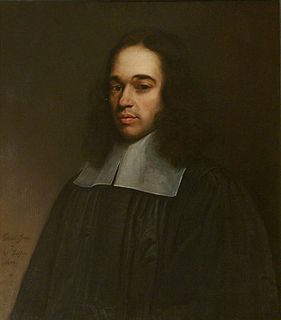A Quote by Theodore Roosevelt
If a strong man has not in him the lift toward lofty things, his strength makes him only a curse to himself and his neighbor.
Related Quotes
Some souls think that the Holy Spirit is very far away, far, far, up above. Actually he is, we might say, the divine Person who is most closely present to the creature. He accompanies him everywhere. He penetrates him with himself. He calls him, he protects him. He makes of him his living temple. He defends him. He helps him. He guards him from all his enemies. He is closer to him than his own soul. All the good a soul accomplishes, it carries out under his inspiration, in his light, by his grace and his help.
[Man] is the only animal who lives outside of himself, whose drive is in external things—property, houses, money, concepts of power. He lives in his cities and his factories, in his business and job and art. But having projected himself into these external complexities, he is them. His house, his automobile are a part of him and a large part of him. This is beautifully demonstrated by a thing doctors know—that when a man loses his possessions a very common result is sexual impotence.
The analytical writer observes the reader as he is; accordingly, he makes his calculation, sets his machine to make the appropriate effect on him. The synthetic writer constructs and creates his own reader; he does not imagine him as resting and dead, but lively and advancing toward him. He makes that which he had invented gradually take shape before the reader's eyes, or he tempts him to do the inventing for himself. He does not want to make a particular effect on him, but rather enters into a solemn relationship of innermost symphilosophy or sympoetry.
It makes him contemptible to be considered fickle, frivolous, effeminate, mean-spirited, irresolute, from all of which a prince should guard himself as from a rock; and he should endeavour to show in his actions greatness, courage, gravity, and fortitude; and in his private dealings with his subjects let him show that his judgments are irrevocable, and maintain himself in such reputation that no one can hope either to deceive him or to get round him.
He is the richest man who enriches his country most; in whom the people feel richest and proudest; who gives himself with his money; who opens the doors of opportunity widest to those about him; who is ears to the deaf; eyes to the blind, and feet to the lame. Such a man makes every acre of land in his community worth more, and makes richer every man who lives near him.
No man could bring himself to reveal his true character, and, above all, his true limitations as a citizen and a Christian, his true meannesses, his true imbecilities, to his friends, or even to his wife. Honest autobiography is therefore a contradiction in terms: the moment a man considers himself, even in petto, he tries to gild and fresco himself. Thus a man's wife, however realistic her view of him, always flatters him in the end, for the worst she sees in him is appreciably better, by the time she sees it, than what is actually there.
Strange is the vigour in a brave man's soul. The strength of his spirit and his irresistible power, the greatness of his heart and the height of his condition, his mighty confidence and contempt of danger, his true security and repose in himself, his liberty to dare and do what he pleaseth, his alacrity in the midst of fears, his invincible temper, are advantages which make him master of fortune.
I'll not meddle with it; it is a dangerous thing; it makes a man a coward; a man cannot steal, but it accuseth him; a man cannot swear, but it checks him; a man cannot lie with his neighbor's wife, but it detects him. 'Tis a blushing, shame -faced spirit, that mutinies in a man's bosom ; it fills one full of obstacles; it made me once restore a purse of gold that by chance I found; it beggars any man that keeps it; it is turned out of all towns and cities for a dangerous thing; and every man that means to live well endeavors to trust to himself and live without it.
Often nothing keeps the pupil on the move but his faith in his teacher, whose mastery is now beginning to dawn on him .... How far the pupil will go is not the concern of the teacher and master. Hardly has he shown him the right way when he must let him go on alone. There is only one thing more he can do to help him endure his loneliness: he turns him away from himself, from the Master, by exhorting him to go further than he himself has done, and to "climb on the shoulders of his teacher."
"If a man finds it very hard to forgive injuries, let him look at a Crucifix, and think that Christ shed all His Blood for him, and not only forgave His enemies, but even prayed His Heavenly Father to forgive them also. Let him remember that when he says the Pater Noster, every day, instead of asking pardon for his sins, he is calling down vengeance on himself."
Man... knows only when he is satisfied and when he suffers, and only his sufferings and his satisfactions instruct him concerning himself, teach him what to seek and what to avoid. For the rest, man is a confused creature; he knows not whence he comes or whither he goes, he knows little of the world, and above all, he knows little of himself.


































